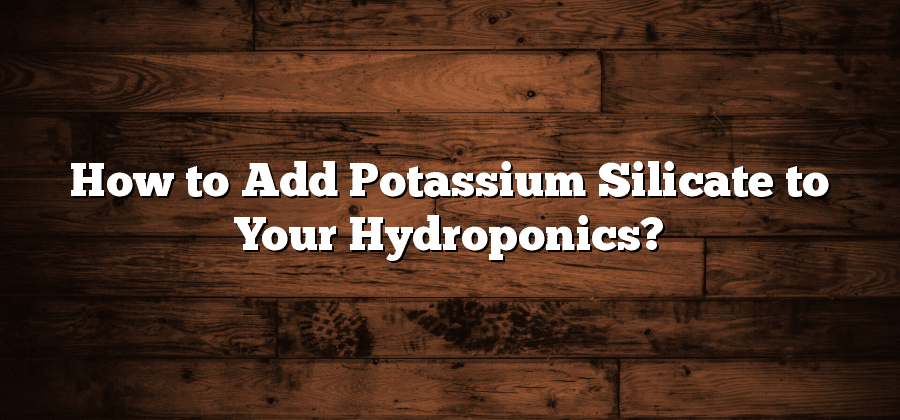Benefits of Using Potassium Silicate in Hydroponics
Potassium silicate is a valuable addition to any hydroponics system due to its numerous benefits for plant growth. One of the key advantages is its ability to enhance the overall strength and structure of plants. By reinforcing cell walls, potassium silicate promotes sturdy stems and healthier root systems, leading to improved nutrient uptake. This results in stronger, more resilient plants that are better equipped to withstand environmental stressors such as temperature fluctuations or pest attacks.
Another significant benefit of using potassium silicate in hydroponics is its role in boosting disease resistance. The application of potassium silicate has been shown to activate the plant’s natural defense mechanisms, increasing its ability to fight off pathogens. This is particularly important in hydroponics, where plants are more vulnerable to diseases due to the absence of soil and the increased risk of microbial growth. By incorporating potassium silicate into the nutrient solution, hydroponic growers can help safeguard their crops against common infections, leading to higher yields and healthier plants.
Understanding the Role of Potassium Silicate in Plant Growth
Potassium silicate plays a crucial role in the growth and development of plants in hydroponics systems. It is a compound that provides plants with an essential nutrient, potassium, and silicon, an element that is often overlooked but is highly beneficial for plant health.
Potassium is one of the primary macronutrients required by plants, and it is involved in many vital functions, including photosynthesis, enzyme activation, and water regulation. It promotes root development, strengthens cell walls, and helps plants cope with various environmental stresses such as drought, heat, and disease. Additionally, potassium enhances the transport of nutrients throughout the plant, ensuring optimal nutrient uptake and utilization. Silicon, on the other hand, is not considered an essential nutrient for plants, but it has been shown to offer numerous benefits. It improves plants’ ability to withstand abiotic stresses such as high temperatures, cold, and salinity, while also enhancing their resistance to pathogens.
Choosing the Right Potassium Silicate Product for Your Hydroponics System
When it comes to choosing the right potassium silicate product for your hydroponics system, there are a few key factors to consider. First and foremost, it is important to look for a product that is specifically designed for hydroponic use. This ensures that the potassium silicate is in a form that can be easily absorbed by the plants in your system, leading to optimal growth and health.
In addition to the formulation, it is also crucial to consider the concentration of potassium silicate in the product. Different plants have varying nutrient requirements, so it is important to choose a product that provides the appropriate level of potassium and silicon for your specific crop. Checking the label or consulting with a supplier can help you determine the concentration of potassium silicate in a product and whether it aligns with your plants’ needs.
Lastly, consider the reputation of the brand or manufacturer when choosing a potassium silicate product. Look for companies that are known for their quality and reliability. Reading customer reviews and seeking recommendations from experienced hydroponic growers can also provide valuable insights into the effectiveness of different products.
By taking these factors into account, you can make an informed decision when selecting the right potassium silicate product for your hydroponics system. Remember, the right choice can help optimize your plants’ nutrient uptake, leading to healthier and more productive growth.
Preparing Your Hydroponics Nutrient Solution for Potassium Silicate Addition
In order to prepare your hydroponics nutrient solution for the addition of potassium silicate, it is important to follow a few key steps. First, it is crucial to thoroughly mix your existing nutrient solution to ensure all components are well-distributed. This will create a uniform base for the addition of potassium silicate. Next, measure out the appropriate amount of potassium silicate according to the instructions provided by the manufacturer. It is important to note that the dosage will vary depending on the specific product you are using and the size of your hydroponics system.
Determining the Correct Dosage of Potassium Silicate for Your Hydroponics System
Determining the correct dosage of potassium silicate for your hydroponics system is crucial in order to optimize plant growth and yield. The dosage will depend on various factors, such as the type of plants you are growing, the stage of growth they are in, and the specific nutrient requirements of your hydroponics system.
To determine the correct dosage, you should start by referring to the manufacturer’s instructions for the potassium silicate product you are using. These instructions will usually provide a recommended dosage range based on the volume of your nutrient solution or the number of plants in your system. It is important to follow these guidelines as they have been formulated based on extensive research and testing.
However, it is also important to keep in mind that these recommended dosages are just a starting point. Each hydroponics system is unique, and you may need to make adjustments based on the specific needs of your plants. Regular monitoring of plant health and growth is essential in order to fine-tune your dosage. By observing how your plants respond to the potassium silicate treatment, you can make adjustments as needed to ensure optimal growth and development.






